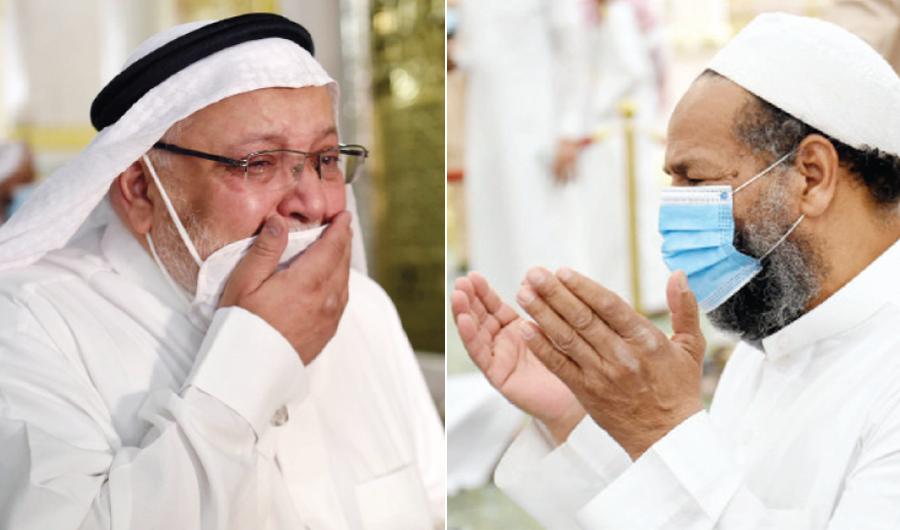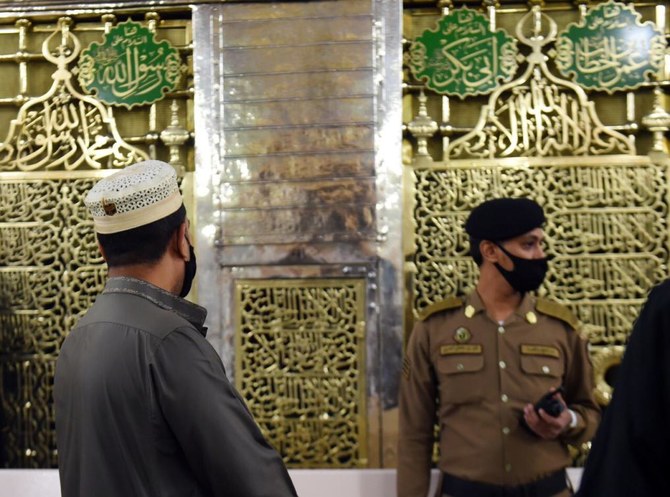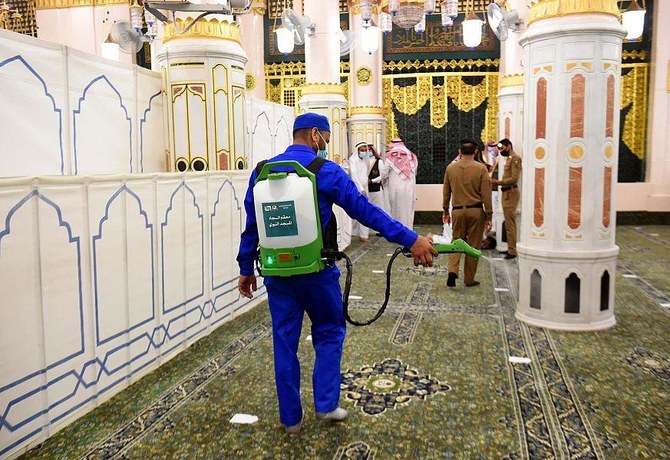JEDDAH: At dawn on Sunday, worshippers returned to visit and pray at the Holy Rawdah at the Prophet’s Mosque in Madinah for the first time in almost seven months. The holy place, the full name of which is Al-Rawdah Al-Sharifa (The Exalted Garden), was closed due to the COVID-19 outbreak in the Kingdom in March. Although the Prophet’s Mosque opened its doors to receive prayers in June, a ban on access to the Rawdah remained in place.
The Holy Rawdah lies between the Sacred Chamber (known as the Prophet’s house), and the Prophet’s Minbar (or pulpit). This southeastern section of the Prophet’s Mosque is where his house once stood, where he lived with his wife Aisha bint Abu Bakr and is buried. It is of extremely great religious value to Muslims. “Between my house and my pulpit lies a garden from the gardens of Paradise,” says a Hadith from Bukhari.
Worshippers were emotionally moved at being able to pray in the Holy Rawdah and to pay tribute to the Prophet (PBUH) and to his two companions, Abu Bakr Siddiq and Omar ibn Al-Khattab at their graves.
“I was blessed to be among the first group of female visitors to Rawdah on the first morning of Rabi Al-Awwal month,” Hanan Al-Jihani, 39, told Arab News. “It is an extraordinary experience on an exceptional day.”
Al-Jihani was able to book her slot through the Eatmarna app launched earlier last month. “They first made sure that my visit barcode was right and checked my body temperature, then we waited for a few minutes before we were allowed to enter Rawdah,” she added.
Al-Jihani recalled the warm welcome of female employees and the smell of Bakhour (incense) in the air across the mosque. “We ask God for help and success for the government and all security staff, employees, workers and volunteers serving the Holy Prophet’s Mosque.”

Eman Mahmoud, from Jeddah, said, “It is definitely a blessed day at the beginning of a blessed month when the Prophet, peace be upon him, was born. I couldn’t have been happier when I heard that we could finally visit the sacred chamber and greet our prophet, praise be to god,” she said.
The 50-year-old, who is a frequent visitor to Madinah and the Prophet’s Mosque, said that the past months have been difficult for everyone, “I cannot express how much I miss the old days at the Prophet’s Mosque. I hope the crisis ends soon and all Muslims can enjoy their heart-purifying spiritual experience at the mosque.”
The prophet was born on the 12th day of the Islamic month of Rabi Al-Awwal, which started on Sunday. Most Muslims around the world consider this month a blessed one and celebrate the Prophet’s birthday with various religious traditions.
Visits are based according to the restricted capacity of the Rawdah. Worshippers can apply for a permit through the Eatmarna app, where they are offered the option to pray in the Prophet’s Mosque, pray in Rawdah, or greet the Prophet.
Quba Mosque was also opened on Sunday at dawn prayers. “The mosque will be open from Fajr to Isha prayers while maintaining all precautionary measures,” said Wajab Al-Otaibi, general director of the Ministry of Islamic Affairs branch in Madinah.
“Last year, King Salman directed the opening of Quba Mosque 24 hours a day, but during the pandemic, the mosques were closed. Now, as we reopen the mosques, Quba will only receive visitors within the approved time, which is the five prayers and the times in between,” he said.
Worshipers should bring their own praying mats with them, Al-Otaibi added.
Quba Mosque, which lies to the south of Madinah, is the second most prestigious mosque in the city after the Prophet’s Mosque, but is the most important for having been built in the first year of the Islamic calendar.
The General Presidency of the Grand Mosque and the Prophet’s Mosque, in collaboration with the Ministry of Hajj and Umrah, the Ministry of Health and a number of security agencies, have made all preparations to serve the visitors and worshippers according to COVID-19 preventive measures.
Machinery haS been installed to sanitize the halls, floors, carpets, and Mosque gates with environmentally friendly materials.
The General Syndicate of Cars is providing buses to transport visitors and worshippers between parking lots allocated to them and the Grand Mosque.
Furthermore, 531 Umrah companies are getting ready to receive visitors from abroad in the third step in the phased restoration of Umrah services on Nov. 1.
Hani Al-Omairi, a member of the National Committee for Hajj and Umrah and of the Hotels Committee in Makkah, said that Umrah companies had organized specialized workshops to train their employees on how to act in crisis situations, crowd management, receiving visitors, at the airport and in hotels, supervising their entrance into the Grand Mosque, and taking appointments via the Eatmarna app.































